A Critical Analysis of International Business and Globalisation
VerifiedAdded on 2023/06/10
|7
|1359
|149
Report
AI Summary
This report provides a critical analysis of international business and globalization, focusing on its impact on emerging economies. It examines the economic well-being of these nations, evaluating the argument that globalization fosters employment, and discusses the potential for exploitation within the international business framework. The report delves into the integration of economies, the role of foreign direct investment, and the influence of multinational corporations. It considers both the positive aspects, such as increased business opportunities and improved standards of living, and the negative implications, including the destruction of indigenous industries and the exploitation of resources. The analysis draws from various sources to present a balanced view of globalization's complex effects.
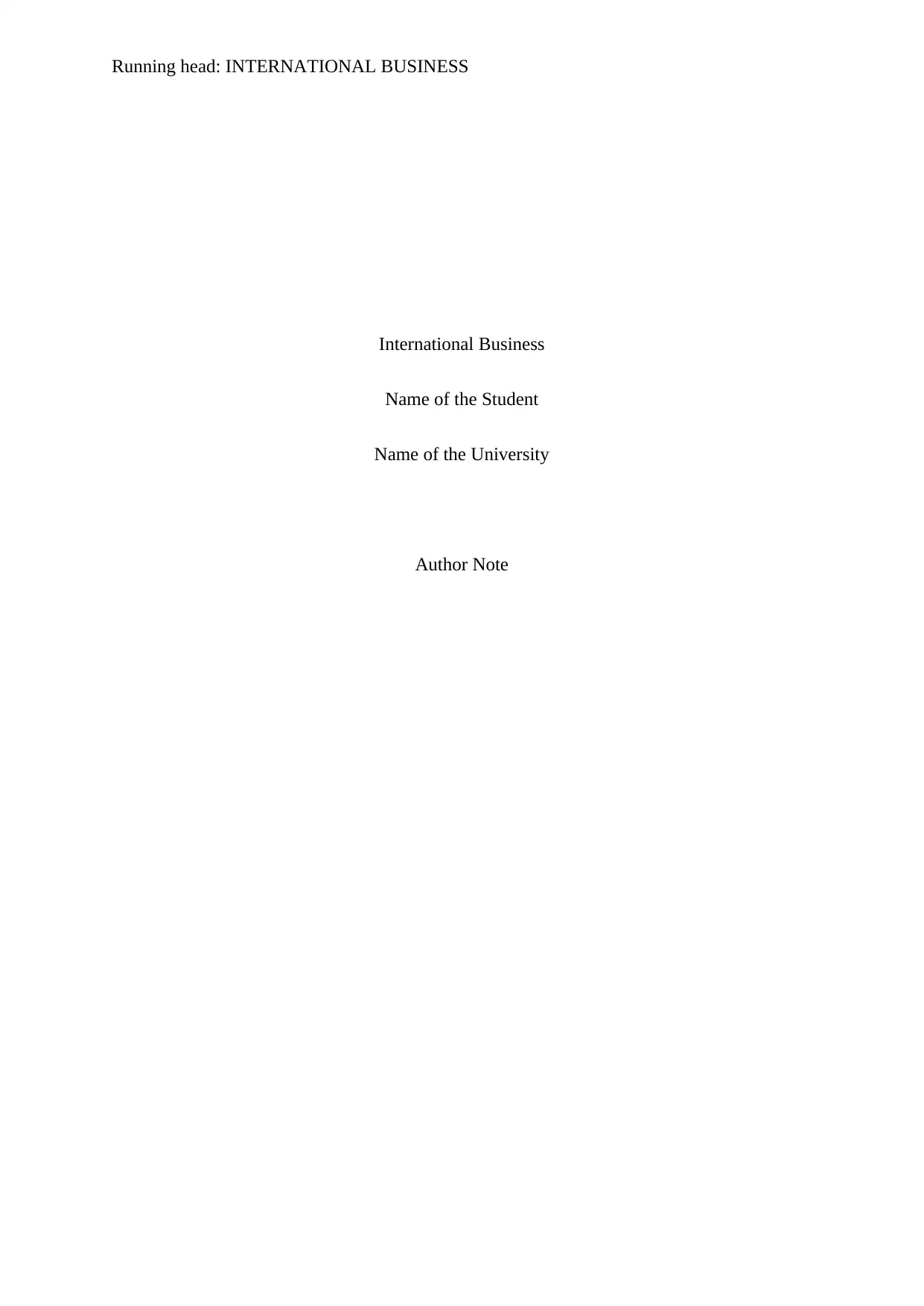
Running head: INTERNATIONAL BUSINESS
International Business
Name of the Student
Name of the University
Author Note
International Business
Name of the Student
Name of the University
Author Note
Paraphrase This Document
Need a fresh take? Get an instant paraphrase of this document with our AI Paraphraser
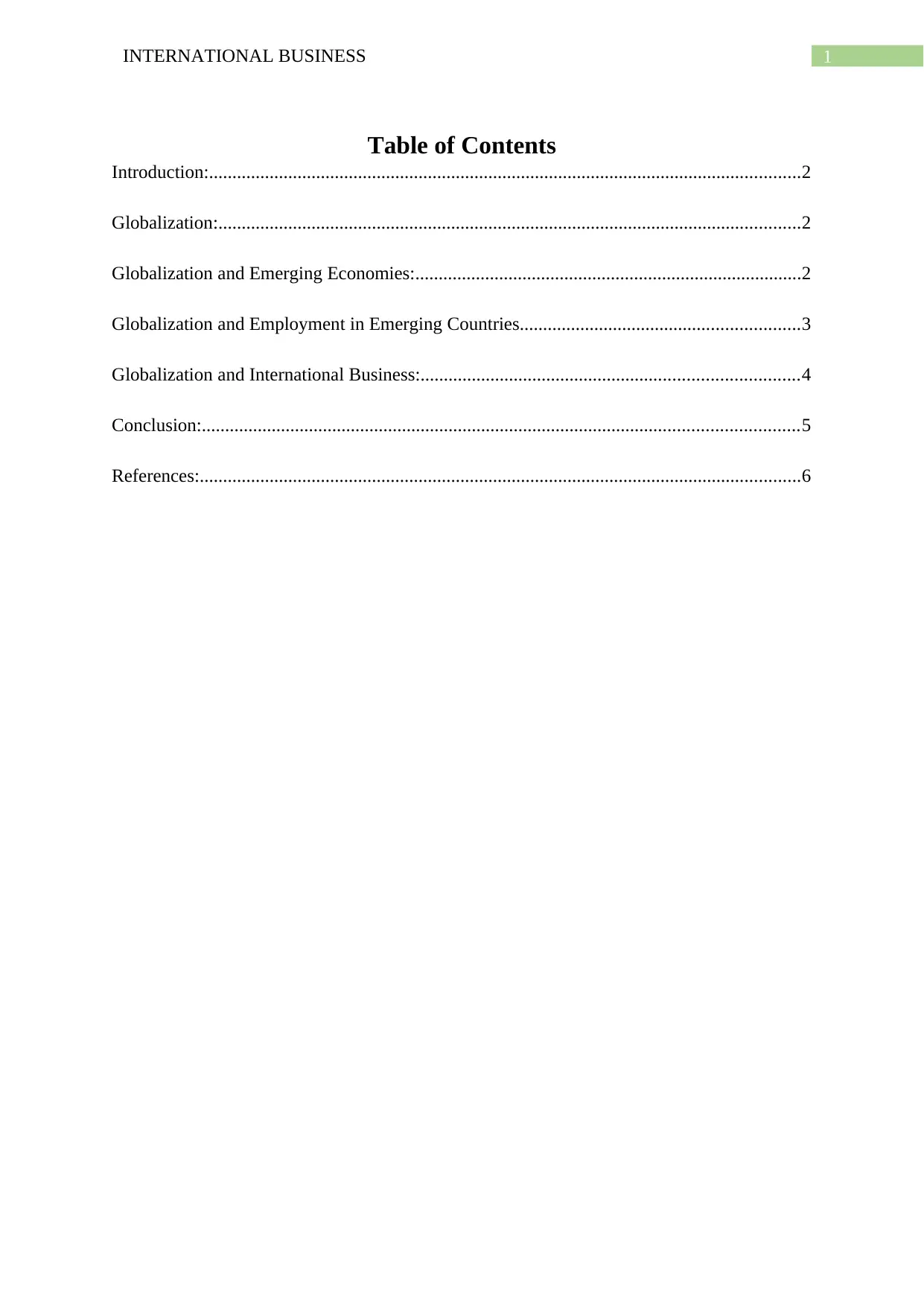
1INTERNATIONAL BUSINESS
Table of Contents
Introduction:...............................................................................................................................2
Globalization:.............................................................................................................................2
Globalization and Emerging Economies:...................................................................................2
Globalization and Employment in Emerging Countries............................................................3
Globalization and International Business:.................................................................................4
Conclusion:................................................................................................................................5
References:.................................................................................................................................6
Table of Contents
Introduction:...............................................................................................................................2
Globalization:.............................................................................................................................2
Globalization and Emerging Economies:...................................................................................2
Globalization and Employment in Emerging Countries............................................................3
Globalization and International Business:.................................................................................4
Conclusion:................................................................................................................................5
References:.................................................................................................................................6
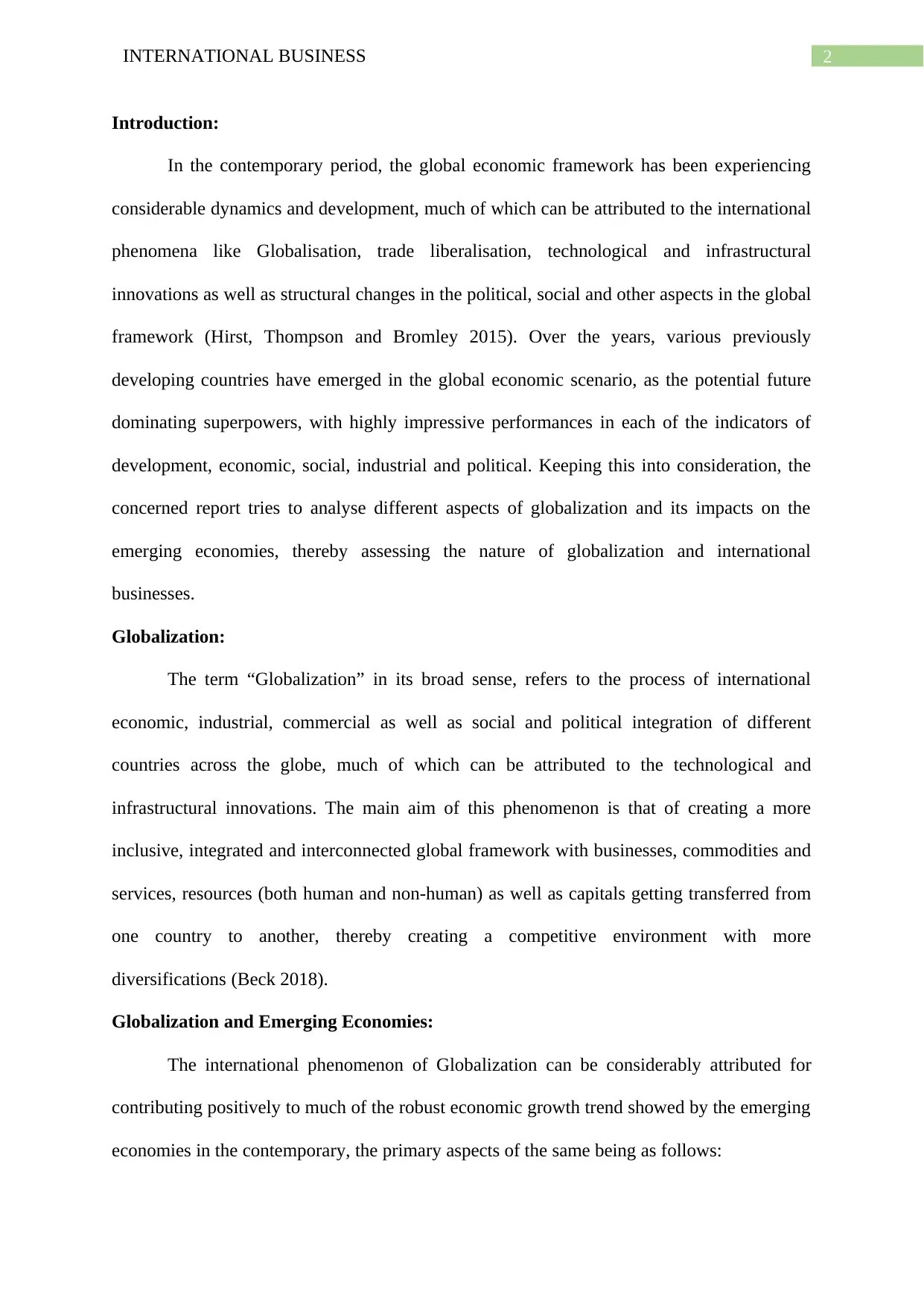
2INTERNATIONAL BUSINESS
Introduction:
In the contemporary period, the global economic framework has been experiencing
considerable dynamics and development, much of which can be attributed to the international
phenomena like Globalisation, trade liberalisation, technological and infrastructural
innovations as well as structural changes in the political, social and other aspects in the global
framework (Hirst, Thompson and Bromley 2015). Over the years, various previously
developing countries have emerged in the global economic scenario, as the potential future
dominating superpowers, with highly impressive performances in each of the indicators of
development, economic, social, industrial and political. Keeping this into consideration, the
concerned report tries to analyse different aspects of globalization and its impacts on the
emerging economies, thereby assessing the nature of globalization and international
businesses.
Globalization:
The term “Globalization” in its broad sense, refers to the process of international
economic, industrial, commercial as well as social and political integration of different
countries across the globe, much of which can be attributed to the technological and
infrastructural innovations. The main aim of this phenomenon is that of creating a more
inclusive, integrated and interconnected global framework with businesses, commodities and
services, resources (both human and non-human) as well as capitals getting transferred from
one country to another, thereby creating a competitive environment with more
diversifications (Beck 2018).
Globalization and Emerging Economies:
The international phenomenon of Globalization can be considerably attributed for
contributing positively to much of the robust economic growth trend showed by the emerging
economies in the contemporary, the primary aspects of the same being as follows:
Introduction:
In the contemporary period, the global economic framework has been experiencing
considerable dynamics and development, much of which can be attributed to the international
phenomena like Globalisation, trade liberalisation, technological and infrastructural
innovations as well as structural changes in the political, social and other aspects in the global
framework (Hirst, Thompson and Bromley 2015). Over the years, various previously
developing countries have emerged in the global economic scenario, as the potential future
dominating superpowers, with highly impressive performances in each of the indicators of
development, economic, social, industrial and political. Keeping this into consideration, the
concerned report tries to analyse different aspects of globalization and its impacts on the
emerging economies, thereby assessing the nature of globalization and international
businesses.
Globalization:
The term “Globalization” in its broad sense, refers to the process of international
economic, industrial, commercial as well as social and political integration of different
countries across the globe, much of which can be attributed to the technological and
infrastructural innovations. The main aim of this phenomenon is that of creating a more
inclusive, integrated and interconnected global framework with businesses, commodities and
services, resources (both human and non-human) as well as capitals getting transferred from
one country to another, thereby creating a competitive environment with more
diversifications (Beck 2018).
Globalization and Emerging Economies:
The international phenomenon of Globalization can be considerably attributed for
contributing positively to much of the robust economic growth trend showed by the emerging
economies in the contemporary, the primary aspects of the same being as follows:
⊘ This is a preview!⊘
Do you want full access?
Subscribe today to unlock all pages.

Trusted by 1+ million students worldwide
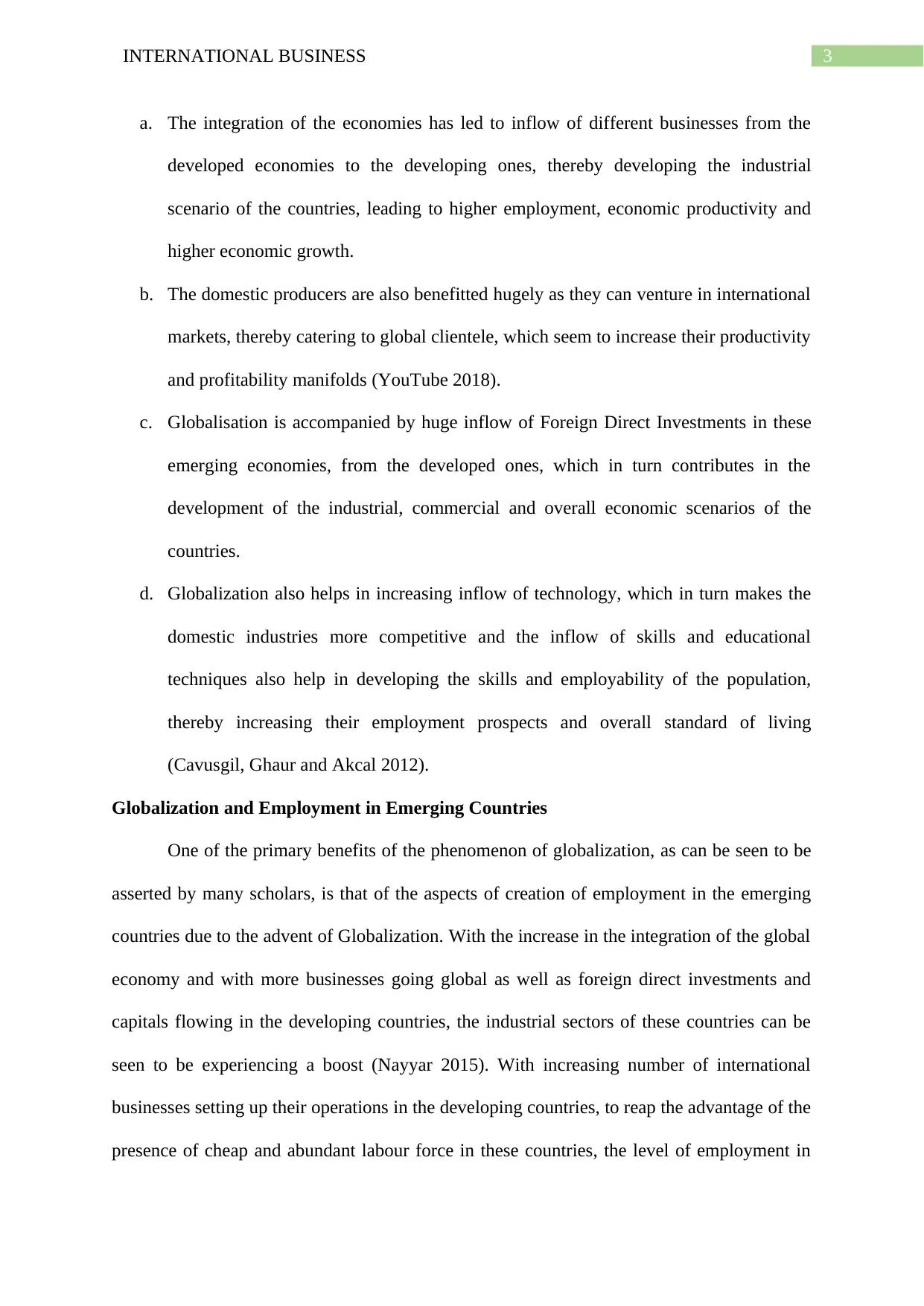
3INTERNATIONAL BUSINESS
a. The integration of the economies has led to inflow of different businesses from the
developed economies to the developing ones, thereby developing the industrial
scenario of the countries, leading to higher employment, economic productivity and
higher economic growth.
b. The domestic producers are also benefitted hugely as they can venture in international
markets, thereby catering to global clientele, which seem to increase their productivity
and profitability manifolds (YouTube 2018).
c. Globalisation is accompanied by huge inflow of Foreign Direct Investments in these
emerging economies, from the developed ones, which in turn contributes in the
development of the industrial, commercial and overall economic scenarios of the
countries.
d. Globalization also helps in increasing inflow of technology, which in turn makes the
domestic industries more competitive and the inflow of skills and educational
techniques also help in developing the skills and employability of the population,
thereby increasing their employment prospects and overall standard of living
(Cavusgil, Ghaur and Akcal 2012).
Globalization and Employment in Emerging Countries
One of the primary benefits of the phenomenon of globalization, as can be seen to be
asserted by many scholars, is that of the aspects of creation of employment in the emerging
countries due to the advent of Globalization. With the increase in the integration of the global
economy and with more businesses going global as well as foreign direct investments and
capitals flowing in the developing countries, the industrial sectors of these countries can be
seen to be experiencing a boost (Nayyar 2015). With increasing number of international
businesses setting up their operations in the developing countries, to reap the advantage of the
presence of cheap and abundant labour force in these countries, the level of employment in
a. The integration of the economies has led to inflow of different businesses from the
developed economies to the developing ones, thereby developing the industrial
scenario of the countries, leading to higher employment, economic productivity and
higher economic growth.
b. The domestic producers are also benefitted hugely as they can venture in international
markets, thereby catering to global clientele, which seem to increase their productivity
and profitability manifolds (YouTube 2018).
c. Globalisation is accompanied by huge inflow of Foreign Direct Investments in these
emerging economies, from the developed ones, which in turn contributes in the
development of the industrial, commercial and overall economic scenarios of the
countries.
d. Globalization also helps in increasing inflow of technology, which in turn makes the
domestic industries more competitive and the inflow of skills and educational
techniques also help in developing the skills and employability of the population,
thereby increasing their employment prospects and overall standard of living
(Cavusgil, Ghaur and Akcal 2012).
Globalization and Employment in Emerging Countries
One of the primary benefits of the phenomenon of globalization, as can be seen to be
asserted by many scholars, is that of the aspects of creation of employment in the emerging
countries due to the advent of Globalization. With the increase in the integration of the global
economy and with more businesses going global as well as foreign direct investments and
capitals flowing in the developing countries, the industrial sectors of these countries can be
seen to be experiencing a boost (Nayyar 2015). With increasing number of international
businesses setting up their operations in the developing countries, to reap the advantage of the
presence of cheap and abundant labour force in these countries, the level of employment in
Paraphrase This Document
Need a fresh take? Get an instant paraphrase of this document with our AI Paraphraser
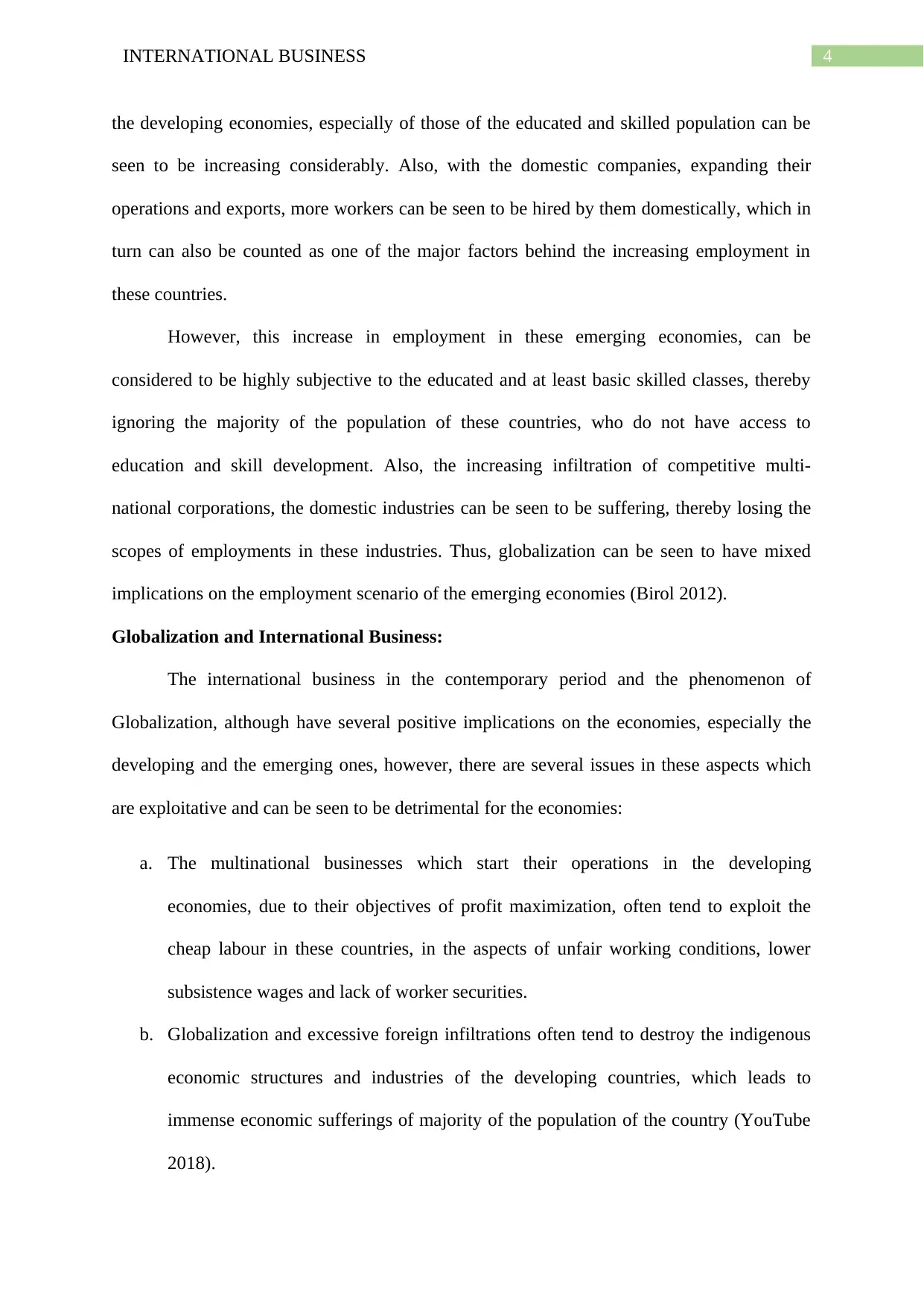
4INTERNATIONAL BUSINESS
the developing economies, especially of those of the educated and skilled population can be
seen to be increasing considerably. Also, with the domestic companies, expanding their
operations and exports, more workers can be seen to be hired by them domestically, which in
turn can also be counted as one of the major factors behind the increasing employment in
these countries.
However, this increase in employment in these emerging economies, can be
considered to be highly subjective to the educated and at least basic skilled classes, thereby
ignoring the majority of the population of these countries, who do not have access to
education and skill development. Also, the increasing infiltration of competitive multi-
national corporations, the domestic industries can be seen to be suffering, thereby losing the
scopes of employments in these industries. Thus, globalization can be seen to have mixed
implications on the employment scenario of the emerging economies (Birol 2012).
Globalization and International Business:
The international business in the contemporary period and the phenomenon of
Globalization, although have several positive implications on the economies, especially the
developing and the emerging ones, however, there are several issues in these aspects which
are exploitative and can be seen to be detrimental for the economies:
a. The multinational businesses which start their operations in the developing
economies, due to their objectives of profit maximization, often tend to exploit the
cheap labour in these countries, in the aspects of unfair working conditions, lower
subsistence wages and lack of worker securities.
b. Globalization and excessive foreign infiltrations often tend to destroy the indigenous
economic structures and industries of the developing countries, which leads to
immense economic sufferings of majority of the population of the country (YouTube
2018).
the developing economies, especially of those of the educated and skilled population can be
seen to be increasing considerably. Also, with the domestic companies, expanding their
operations and exports, more workers can be seen to be hired by them domestically, which in
turn can also be counted as one of the major factors behind the increasing employment in
these countries.
However, this increase in employment in these emerging economies, can be
considered to be highly subjective to the educated and at least basic skilled classes, thereby
ignoring the majority of the population of these countries, who do not have access to
education and skill development. Also, the increasing infiltration of competitive multi-
national corporations, the domestic industries can be seen to be suffering, thereby losing the
scopes of employments in these industries. Thus, globalization can be seen to have mixed
implications on the employment scenario of the emerging economies (Birol 2012).
Globalization and International Business:
The international business in the contemporary period and the phenomenon of
Globalization, although have several positive implications on the economies, especially the
developing and the emerging ones, however, there are several issues in these aspects which
are exploitative and can be seen to be detrimental for the economies:
a. The multinational businesses which start their operations in the developing
economies, due to their objectives of profit maximization, often tend to exploit the
cheap labour in these countries, in the aspects of unfair working conditions, lower
subsistence wages and lack of worker securities.
b. Globalization and excessive foreign infiltrations often tend to destroy the indigenous
economic structures and industries of the developing countries, which leads to
immense economic sufferings of majority of the population of the country (YouTube
2018).
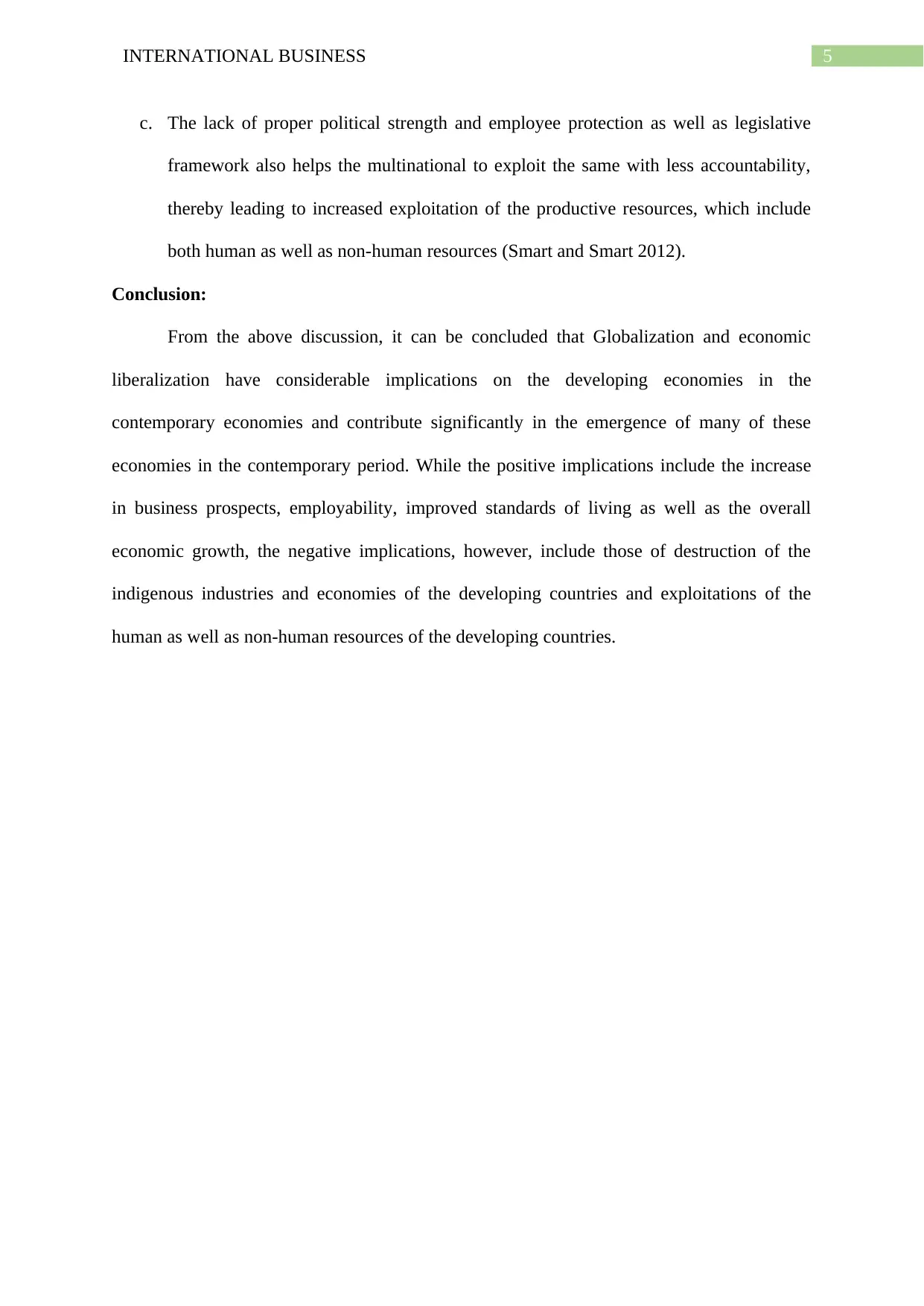
5INTERNATIONAL BUSINESS
c. The lack of proper political strength and employee protection as well as legislative
framework also helps the multinational to exploit the same with less accountability,
thereby leading to increased exploitation of the productive resources, which include
both human as well as non-human resources (Smart and Smart 2012).
Conclusion:
From the above discussion, it can be concluded that Globalization and economic
liberalization have considerable implications on the developing economies in the
contemporary economies and contribute significantly in the emergence of many of these
economies in the contemporary period. While the positive implications include the increase
in business prospects, employability, improved standards of living as well as the overall
economic growth, the negative implications, however, include those of destruction of the
indigenous industries and economies of the developing countries and exploitations of the
human as well as non-human resources of the developing countries.
c. The lack of proper political strength and employee protection as well as legislative
framework also helps the multinational to exploit the same with less accountability,
thereby leading to increased exploitation of the productive resources, which include
both human as well as non-human resources (Smart and Smart 2012).
Conclusion:
From the above discussion, it can be concluded that Globalization and economic
liberalization have considerable implications on the developing economies in the
contemporary economies and contribute significantly in the emergence of many of these
economies in the contemporary period. While the positive implications include the increase
in business prospects, employability, improved standards of living as well as the overall
economic growth, the negative implications, however, include those of destruction of the
indigenous industries and economies of the developing countries and exploitations of the
human as well as non-human resources of the developing countries.
⊘ This is a preview!⊘
Do you want full access?
Subscribe today to unlock all pages.

Trusted by 1+ million students worldwide
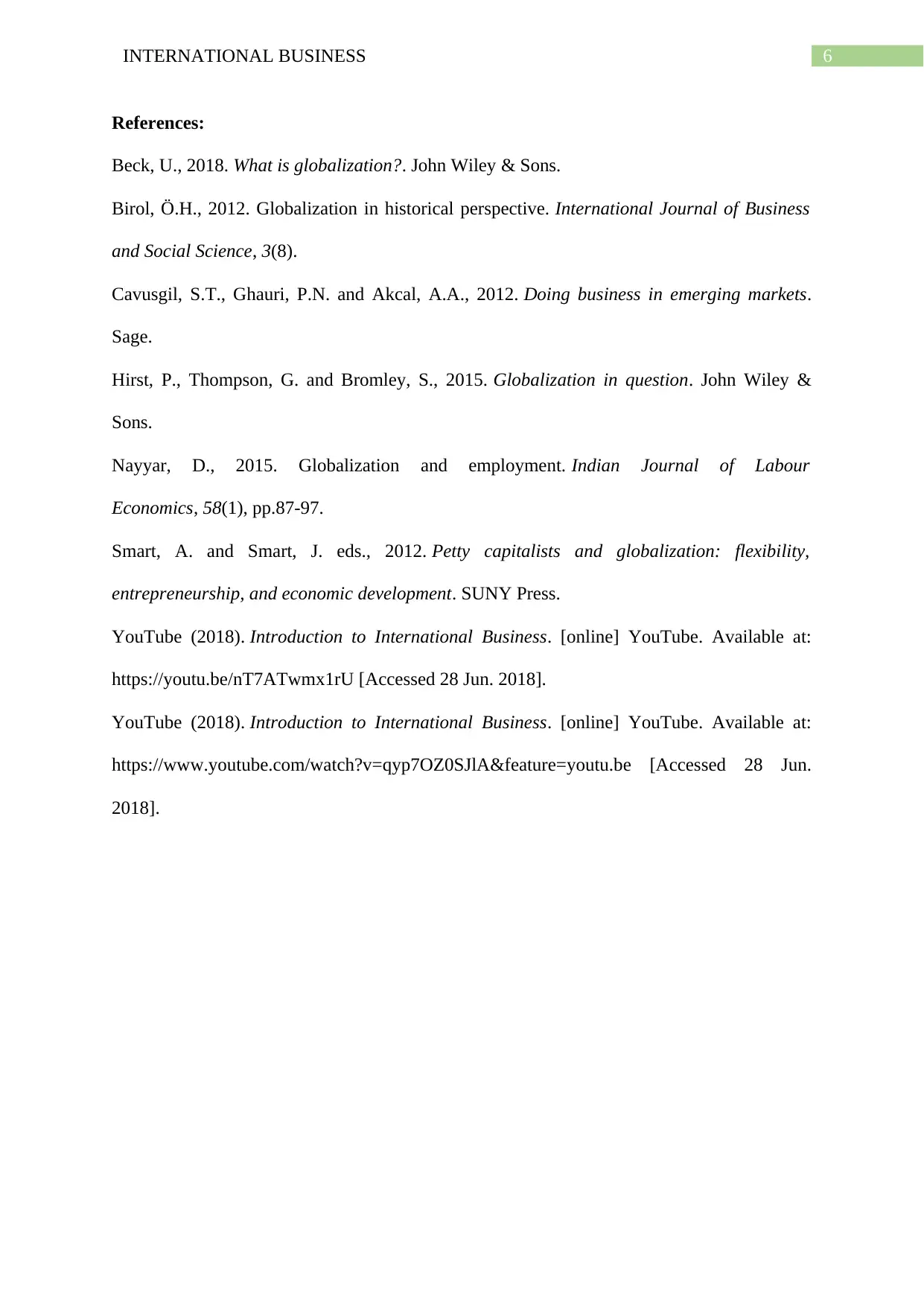
6INTERNATIONAL BUSINESS
References:
Beck, U., 2018. What is globalization?. John Wiley & Sons.
Birol, Ö.H., 2012. Globalization in historical perspective. International Journal of Business
and Social Science, 3(8).
Cavusgil, S.T., Ghauri, P.N. and Akcal, A.A., 2012. Doing business in emerging markets.
Sage.
Hirst, P., Thompson, G. and Bromley, S., 2015. Globalization in question. John Wiley &
Sons.
Nayyar, D., 2015. Globalization and employment. Indian Journal of Labour
Economics, 58(1), pp.87-97.
Smart, A. and Smart, J. eds., 2012. Petty capitalists and globalization: flexibility,
entrepreneurship, and economic development. SUNY Press.
YouTube (2018). Introduction to International Business. [online] YouTube. Available at:
https://youtu.be/nT7ATwmx1rU [Accessed 28 Jun. 2018].
YouTube (2018). Introduction to International Business. [online] YouTube. Available at:
https://www.youtube.com/watch?v=qyp7OZ0SJlA&feature=youtu.be [Accessed 28 Jun.
2018].
References:
Beck, U., 2018. What is globalization?. John Wiley & Sons.
Birol, Ö.H., 2012. Globalization in historical perspective. International Journal of Business
and Social Science, 3(8).
Cavusgil, S.T., Ghauri, P.N. and Akcal, A.A., 2012. Doing business in emerging markets.
Sage.
Hirst, P., Thompson, G. and Bromley, S., 2015. Globalization in question. John Wiley &
Sons.
Nayyar, D., 2015. Globalization and employment. Indian Journal of Labour
Economics, 58(1), pp.87-97.
Smart, A. and Smart, J. eds., 2012. Petty capitalists and globalization: flexibility,
entrepreneurship, and economic development. SUNY Press.
YouTube (2018). Introduction to International Business. [online] YouTube. Available at:
https://youtu.be/nT7ATwmx1rU [Accessed 28 Jun. 2018].
YouTube (2018). Introduction to International Business. [online] YouTube. Available at:
https://www.youtube.com/watch?v=qyp7OZ0SJlA&feature=youtu.be [Accessed 28 Jun.
2018].
1 out of 7
Related Documents
Your All-in-One AI-Powered Toolkit for Academic Success.
+13062052269
info@desklib.com
Available 24*7 on WhatsApp / Email
![[object Object]](/_next/static/media/star-bottom.7253800d.svg)
Unlock your academic potential
Copyright © 2020–2026 A2Z Services. All Rights Reserved. Developed and managed by ZUCOL.





